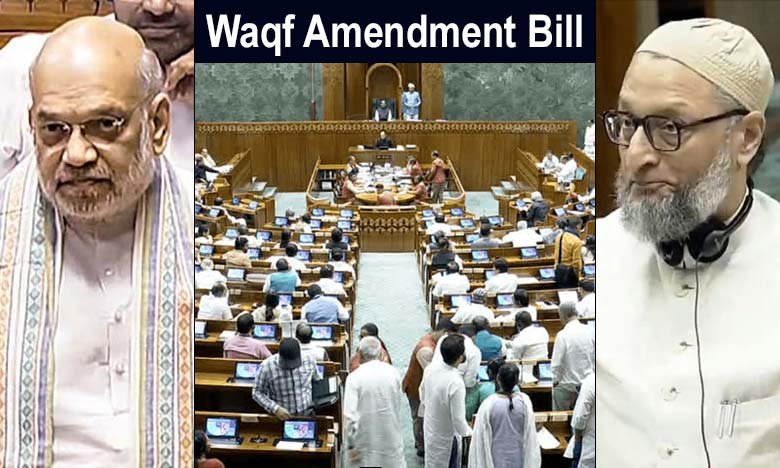Breaking News: Waqf Amendment Bill Passed in Lok Sabha: 288 Votes in Favor, 232 Against

- Key Role of Chandrababu Naidu and Nitish Kumar in Bill’s Approval
- Despite Strong Opposition, Modi Government Used Its Majority
- Prime Minister Did Not Participate in Voting; 520 Members Cast Their Votes
- Mandatory Inclusion of Two Non-Muslim Members in Central Waqf Council & Waqf Boards
- Donors Must Have Practiced Islam for at Least 5 Years
- Collector to Decide Ownership of Waqf Properties
New Delhi, 3 April – (www.deccanlive.com): The controversial Waqf (Amendment) Bill 2025 was finally passed by the Modi government in the Lok Sabha after 12 hours of heated discussions. Late at night, members voted, and around 2 AM, it was announced that 288 votes were in favor, while 232 were against.
This bill, which will now be presented in the Rajya Sabha, aims to make changes to the 1995 Waqf Act, which manages Waqf properties. However, some parts of the bill are controversial. One major change is that two non-Muslim members must be included in the Central Waqf Council and Waqf Boards. Also, only those who have followed Islam practically for at least five years can donate property for Waqf.
Another change is that government-owned properties identified as Waqf will no longer be considered Waqf. Instead, the local collector will decide their ownership.
Last year, this bill was first introduced in the Lok Sabha, but strong opposition led by Congress forced the government to send it to the Joint Parliamentary Committee (JPC). The JPC, led by BJP MP Jagdambika Pal, supported the bill and submitted a report to the Speaker.
During the ongoing Budget Session, Minister for Parliamentary and Minority Affairs Kiren Rijiju reintroduced the bill, which has caused concern among Indian Muslims.
However, the current Modi government, which has only 240 seats in the Lok Sabha, received support from key allies like Chandrababu Naidu’s Telugu Desam Party (TDP) from Andhra Pradesh and Nitish Kumar’s Janata Dal (United) (JDU) from Bihar. Because of this support, Prime Minister Modi did not feel the need to attend the debates or voting on the bill. Instead, Home Minister Amit Shah led the NDA alliance against the opposition, which was led by Rahul Gandhi.
As soon as the Parliament’s budget session reached its final stage, Minority Affairs Minister Kiren Rijiju reintroduced the Waqf (Amendment) Bill. Congress leader Gaurav Gogoi started the debate on behalf of the opposition. A heated exchange took place between the treasury benches (ruling party) and the opposition when Minister Kiren Rijiju presented the revised version of the bill, now called the Unified Waqf Management Empowerment, Efficiency, and Development (UMEED) Bill.
The opposition, led by the INDIA bloc, remained firm in its opposition and strongly committed to defeating the bill. The bill was originally introduced last year, but before being reintroduced with amendments, it was sent to the Joint Parliamentary Committee for review.
While defending the amendments, Kiren Rijiju explained the key provisions aimed at improving the management and supervision of Waqf properties. Before the bill was finally passed in the Lok Sabha, both sides strongly presented their arguments. Earlier, all amendments suggested by the opposition were rejected through a voice vote.
After 12 hours of intense debate, the bill was approved. During the discussion, both government and opposition members firmly defended their positions. NDA’s ally parties, Janata Dal (United) (JDU) and Telugu Desam Party (TDP), supported the bill, making it easier for the government to get it passed.
The opposition opposed the bill for various reasons, but the government insisted it was necessary for public welfare. Despite nationwide protests by Muslims and strong objections from the opposition, the bill was finally passed after midnight.
Asaduddin Owaisi, the President of All India Majlis-e-Ittehad-ul-Muslimeen (AIMIM) and Hyderabad MP, participated in the debate and symbolically protested by tearing the bill’s papers. He said he was following the example of Mahatma Gandhi, who had expressed his anger and opposition in a similar way against British laws in South Africa.





